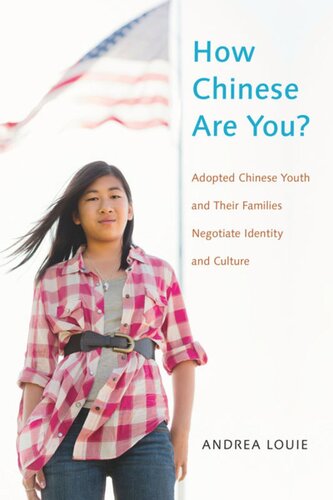

Most ebook files are in PDF format, so you can easily read them using various software such as Foxit Reader or directly on the Google Chrome browser.
Some ebook files are released by publishers in other formats such as .awz, .mobi, .epub, .fb2, etc. You may need to install specific software to read these formats on mobile/PC, such as Calibre.
Please read the tutorial at this link: https://ebookbell.com/faq
We offer FREE conversion to the popular formats you request; however, this may take some time. Therefore, right after payment, please email us, and we will try to provide the service as quickly as possible.
For some exceptional file formats or broken links (if any), please refrain from opening any disputes. Instead, email us first, and we will try to assist within a maximum of 6 hours.
EbookBell Team

4.7
106 reviewsChinese adoption is often viewed as creating new possibilities for the formation of multicultural, cosmopolitan families. For white adoptive families, it is an opportunity to learn more about China and Chinese culture, as many adoptive families today try to honor what they view as their children’s “birth culture.” However, transnational, transracial adoption also presents challenges to families who are trying to impart in their children cultural and racial identities that they themselves do not possess, while at the same time incorporating their own racial, ethnic, and religious identities. Many of their ideas are based on assumptions about how authentic Chinese and Chinese Americans practice Chinese culture.
Based on a comparative ethnographic study of white and Asian American adoptive parents over an eight year period, How Chinese Are You? explores how white adoptive parents, adoption professionals, Chinese American adoptive parents, and teens adopted from China as children negotiate meanings of Chinese identity in the context of race, culture, and family. Viewing Chineseness as something produced, rather than inherited, Andrea Louie examines how the idea of “ethnic options” differs for Asian American versus white adoptive parents as they produce Chinese adoptee identities, while re-working their own ethnic, racial, and parental identities. Considering the broader context of Asian American cultural production, Louie analyzes how both white and Asian American adoptive parents engage in changing understandings of and relationships with “Chineseness” as a form of ethnic identity, racial identity, or cultural capital over the life course. Louie also demonstrates how constructions of Chinese culture and racial identity dynamically play out between parents and their children, and for Chinese adoptee teenagers themselves as they “come of age.” How Chinese Are You? is an engaging and original study of the fluidity of race, ethnicity, and cultural identity in modern America.